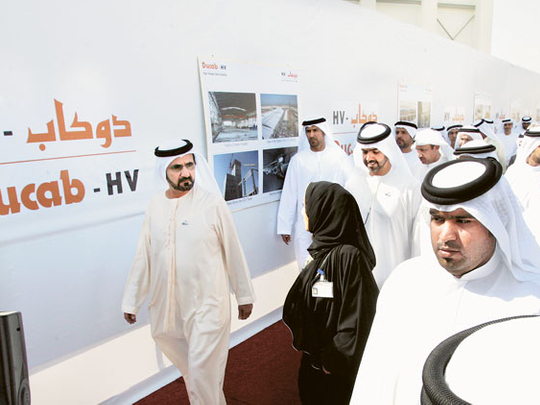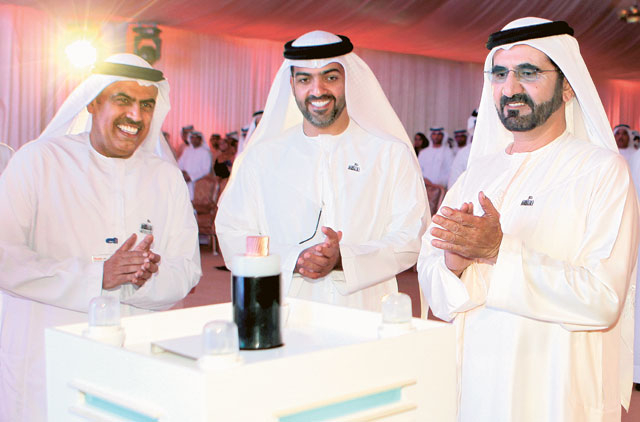
Dubai: Ducab's Dh500 million high voltage (HV) cable plant, which opened yesterday, is expected to export 75 per cent of its production to GCC, European and African markets, according to a top company executive.
His Highness Shaikh Mohammad Bin Rashid Al Maktoum, Vice President and Prime Minister of the UAE and Ruler of Dubai, inaugurated Ducab HV yesterday and took a tour of the plant.
The opening ceremony was also attended by Shaikh Hamed Bin Zayed Al Nahyan, Chairman of the Abu Dhabi Crown Prince's Court, who said this is one of several joint ventures coming up between Abu Dhabi and Dubai.
"Ducab is a facility that has historical value and shows the economic integration between the emirates. It is an important achievement. We hope there is more success achieved in the industrial sector because we need this sector in a bigger way," he said.
"There will soon be industrial partnerships like Emal, and others are on the way, God willing."
Ahmad Al Shaikh, Chairman of Ducab and Ducab-HV, told reporters at the inauguration: "The products of any factory specialising in these cables are not used domestically because there is insufficient infrastructure to justify their use — so our aim is always to export."
Ducab HV has allocated ten per cent of its sales to the Dubai Electricity and Water Authority and the Abu Dhabi Water and Electricity Authority, who are each 25 per cent owners in the plant, he said.
"The partnership with the utility companies is the key," said Jon Vail, CEO of Ducab HV.
Ducab HV is hoping to grab 50 per cent of the UAE market share, which will lead to a quarter of its production being sold domestically, he said.
Incremental increase
Production will begin at ten per cent capacity in the first year and is scheduled to increase incrementally to 30 per cent in 2012, 50 per cent in 2013 and 75 per cent in 2014, Vail added.
Ducab shareholders shouldered 40 per cent of the project funding and 60 per cent was obtained through bank loans, primarily from Noor Islamic Bank, Al Shaikh said.
The Dh500 million cost was split between Dh200 million in construction, Dh200 million in equipment and Dh100 million as working capital.
The return on investments is expected in eight years, Al Shaikh said, adding that fluctuations in copper prices are a determining factor.
"African countries need more infrastructure and there is increasing demand for this type of cable. Europe already has infrastructure but it needs updating, and this means demand for cable," he said, adding that the debt crisis in Europe will mean a "lower percentage" of business than usual with the continent."
The unrest in Libya had initially halted Ducab shipments to the country but there is an opportunity to enhance co-operation with the new government now, felt Al Shaikh.
Future plans
Ducab is also planning to open a specialised cable factory in Qatar, but this is an idea under study, according to Al Shaikh.
Domestic demand for Ducab's HV cables is expected from utilities, big businesses and international companies that take over entire energy stations.
The new plant will generate 130 jobs and 25 per cent of the work force is made up of Emiratis, Al Shaikh noted. The target is 50 per cent of nationals at the managerial level and higher technical posts.













